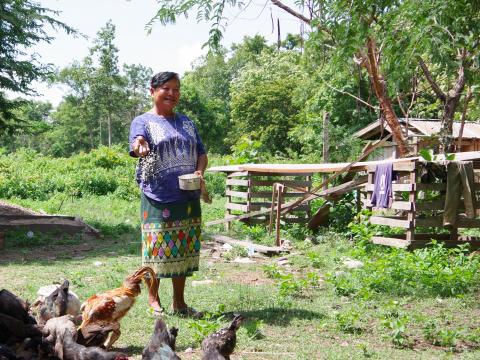The impact of Accelerating Healthy Agriculture and Nutrition project in Davanh’s life

The sun of June is beating down in Attapeu Province, making life tougher for farmers and rice field workers. But it won’t take out Davanh’s smile. While everyone’s will is to stay under a shade, the 60-years old lady will bring you to her attractive home garden to show you how well are the young chickens growing. She will receive you with warm welcoming.
Being grateful is the most accurate word to describe Davanh's feelings. A few years ago, the main source of food for her household was to collect forest products (bamboo, plants) and buy vegetables at the market with the money she earned from animal raising and selling. A way of living that didn’t allow her family to have enough to eat all-year-round, especially with the tuition fees of the children and the medical bills due to waterborne diseases, an undesired but regular expense. An uncomfortable situation progressively ending since the EU-funded AHAN Project started its activities in 2019: “When I attended the Accelerating Healthy Agriculture and Nutrition (AHAN) project’s start-up workshop, I was really interested in the Saving Group activity.
Most of the people in our community are poor, and the lack of knowledge and illiteracy make it more challenging for us to access financial services, with bank loans asking for high-interest rates.
One year after the AHAN start-up, the saving group Davanh joined counts 20 active members, including 17 women, who saved up to 2,670,000 LAK (around 300 USD). “The project provided us training on fund management, administration, lending, basic accounting and how to divide the interests to our members”, explains Davanh. “After saving for 6 months, I borrowed 500,000 LAK from the group. I sent this money to my elder daughter who is studying at University in Champasack to pay her tuition, and I purchased vegetable seeds to grow.”
Onions, coriander, lettuces, long beans, chillies among others. Enough vegetables for Davanh and her family to consume and sell to her community.
During COVID-19, with the closure of the market places, Davanh sold up to 1,000,000 LAK of vegetables, double of the amount she used to sell before: “I will continue home garden and promote it to more families because it can increase the households’ income. It improved the livelihood of my family”.
A great facilitator for the AHAN project in her village, Davanh is also part of the Village Water and Sanitation Management Committee (VWSMC) and chair of the Mother’s Group, where her experience is an asset to convince the young mothers and care givers to join and change the behaviour of the community, to improve the life of children.
“We know that the project will not be here forever, but I believe in all the benefits from AHAN to my community and that we will take it over in the future,” says Davanh.
Community ownership will soon be increased with the start of community-led total sanitation activities, with the objective of being declared open-defecation free village by the end of the year.
At 60 years-old, Davanh can now hope for a better future for her family. Her daughter will graduate this year from the University of Champasack and become a teacher, while her son will start studying a Bachelor in Electricity Sciences thanks to the savings and development of new sources of income.
A life transformation summarizing perfectly how the AHAN integrated approach is impacting the lives of the most vulnerable in Lao PDR.